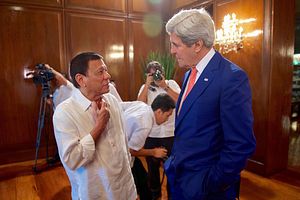Philippine President Rodrigo Duterte has a reputation of being a staunch critic of the United States government. However, it is probably more accurate to describe him as being critical of former U.S. President Barack Obama but not of current President Donald Trump.
A few months after becoming president in 2016, Duterte launched a series of tirades against Obama whose government expressed concern about the Philippines’ bloody war on drugs. Duterte insisted that the United States has no moral high ground to speak about human rights since it has yet to apologize for the crimes it committed during its colonial occupation of the Philippines.
Duterte was the first Filipino leader to speak so publicly and fiercely about the violence used by the U.S. government in subjugating the Filipino nation in 1899. Because of this, Duterte was praised by nationalists and his allies from the left.
Duterte’s pronouncement about the need to enforce an independent foreign policy is seen by some analysts as a rejection of the historic close ties between the United States and the Philippines. This became evident when he announced his “separation” from the United States during a state visit to China.
Duterte’s anti-America rhetoric was so persuasive that it made him the poster child of many groups which want the United States to be accountable for its “meddling” in the affairs of sovereign nations. Indeed, Duterte continues to enjoy this reputation, despite the fact that he has actually already toned down his statements against the United States. He also has continually praised Trump and even emphasized that both of them are controversial politicians who won against all odds.
There are several indicators we can highlight to show that the Philippines under Duterte has not really “separated” from the United States in practice. Consider the following:
- Duterte was among the global leaders who phoned Trump and congratulated him on his electoral victory. Duterte said Trump praised the Philippines’ aggressive campaign to eliminate the drug menace;
- Duterte sent his security adviser and spokesperson to Trump’s inauguration as the 45th U.S. president;
- Duterte’s defense secretary reiterated that the agreement which allows the United States to build facilities (described by critics as the return of U.S. bases) in the Philippines is still valid. Construction of some of these facilities was announced last January;
- Duterte and Trump talked again on the phone last April to discuss the matters related to the Association of Southeast Asian nations (ASEAN), which the Philippines is chairing this year. Duterte said he was invited by Trump to visit the White House, which was later confirmed by US officials;
- Duterte said he called Chinese President Xi Jinping to talk about North Korea’s nuclear testing because this was requested by Trump;
- Despite Duterte’s threat in 2016 to cancel the Balikatan military exercises between the Philippines and the US, the program was reaffirmed this year. In fact, the first Balikatan exercises under the Duterte government started this week
While it is true that Duterte has established closer links with China and Russia, this in fact has yet to translate into the abandonment of the country’s political, economic, military, and cultural ties with the United States. Duterte’s actions and pronouncements in recent months have proved that it is far too simplistic to dismiss him as an anti-American leader.
Duterte had enough time, public support, and the numbers in Congress in the past ten months to cancel all military and political agreements that perpetuate the “unequal relationship” between the United States and the Philippines if he wanted to. But aside from honoring these military agreements, Duterte seems ready to improve his relationship with the Trump government.
Is Duterte pro-China or anti-America? What we learned in the past few months is that Duterte’s mindset cannot be ascertained by his rants but by his actions and the policies implemented by his subordinates.
What is clear is that he succeeded in recalibrating the country’s foreign policy. For his supporters, this is an achievement that reflects Duterte’s vision of an independent foreign policy. His critics, however, is disappointed about the disruption it caused on how the country should assert its claims in the South China Sea.

































